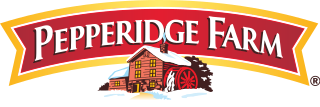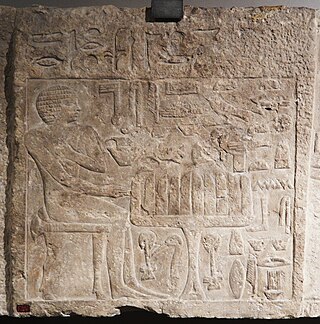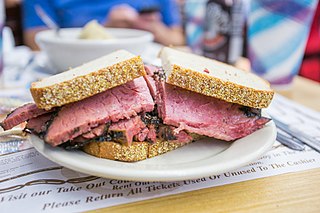
Grits are a type of porridge made from boiled cornmeal. Hominy grits are a type of grits made from hominy – maize that has been treated with an alkali in a process called nixtamalization, with the pericarp removed. Grits are cooked in warm salted water or milk and considered a soup. They are often served with flavorings as a breakfast dish. Grits can be savory or sweet, with savory seasonings being more common. Grits are similar to other thick maize-based porridges from around the world, such as polenta and mieliepap. The dish originated in the Southern United States but is now available nationwide. Grits are often part of a dinner entrée shrimp and grits, served primarily in the South.

Bread is a staple food prepared from a dough of flour and water, usually by baking. Throughout recorded history and around the world, it has been an important part of many cultures' diet. It is one of the oldest human-made foods, having been of significance since the dawn of agriculture, and plays an essential role in both religious rituals and secular culture.

Flour is a powder made by grinding raw grains, roots, beans, nuts, or seeds. Flours are used to make many different foods. Cereal flour, particularly wheat flour, is the main ingredient of bread, which is a staple food for many cultures. Corn flour has been important in Mesoamerican cuisine since ancient times and remains a staple in the Americas. Rye flour is a constituent of bread in both Central Europe and Northern Europe.

Cornmeal is a meal ground from dried corn (maize). It is a common staple food, and is ground to coarse, medium, and fine consistencies, but not as fine as wheat flour can be. In Mexico, very finely ground cornmeal is referred to as corn flour. When fine cornmeal is made from maize that has been soaked in an alkaline solution, e.g., limewater, it is called masa harina, which is used for making arepas, tamales and tortillas. Boiled cornmeal is called polenta in Italy and is also a traditional dish and bread substitute in Romania.

Cornbread is a quick bread made with cornmeal, associated with the cuisine of the Southern United States, with origins in Native American cuisine. It is an example of batter bread. Dumplings and pancakes made with finely ground cornmeal are staple foods of the Hopi people in Arizona. The Hidatsa people of the Upper Midwest call baked cornbread naktsi. Cherokee and Seneca tribes enrich the basic batter, adding chestnuts, sunflower seeds, apples, or berries, and sometimes combine it with beans or potatoes. Modern versions of cornbread are usually leavened by baking powder.

A baker is a tradesperson who bakes and sometimes sells breads and other products made of flour by using an oven or other concentrated heat source. The place where a baker works is called a bakery.

A bakery is an establishment that produces and sells flour-based food baked in an oven such as bread, cookies, cakes, doughnuts, bagels, pastries, and pies. Some retail bakeries are also categorized as cafés, serving coffee and tea to customers who wish to consume the baked goods on the premises. Confectionery items are also made in most bakeries throughout the world.

Polenta is a dish of boiled cornmeal that was historically made from other grains. The dish comes from Italy. It may be allowed to cool and solidify into a loaf that can be baked, fried, or grilled.
Wheat flour is a powder made from the grinding of wheat used for human consumption. Wheat varieties are called "soft" or "weak" if gluten content is low, and are called "hard" or "strong" if they have high gluten content. Hard flour, or bread flour, is high in gluten, with 12% to 14% gluten content, and its dough has elastic toughness that holds its shape well once baked. Soft flour is comparatively low in gluten and thus results in a loaf with a finer, crumbly texture. Soft flour is usually divided into cake flour, which is the lowest in gluten, and pastry flour, which has slightly more gluten than cake flour.

Vienna bread is a type of bread that is produced from a process developed in Vienna, Austria, in the 19th century. The Vienna process used high milling of Hungarian grain, and cereal press-yeast for leavening.

Pepperidge Farm is an American commercial bakery founded in 1937 by Margaret Rudkin, who named the brand after her family's 123-acre farm property in Fairfield, Connecticut, which had been named for the pepperidge tree.

Bread was central to the formation of early human societies. From the Fertile Crescent, where wheat was domesticated, cultivation spread north and west, to Europe and North Africa, and east towards East Asia. This in turn led to the formation of towns, as opposed to the nomadic lifestyle and gave rise to more and more sophisticated forms of societal organization. Similar developments occurred in the Americas with maize and in Asia with rice.
The history of California bread as a prominent factor in the field of bread baking dates from the days of the California Gold Rush around 1849, encompassing the development of sourdough bread in San Francisco. It includes the rise of artisan bakeries in the 1980s, which strongly influenced what has been called the "Bread Revolution".
A Unifine mill is a single one-pass impact milling system which produces ultrafine-milled whole-grain wheat flour that requires no grain pre-treatment and no screening of the flour. Like the grist or stone mills that had dominated the flour industry for centuries, the bran, germ, and endosperm elements of grain are processed into a nutritious whole wheat flour in one step. Consumers had accepted whole wheat products produced by grist or stone mills. The flour produced by these mills was quite coarse as they included the bran and the germ elements of the grain.
Ancient Israelite cuisine refers to the culinary practices of the Israelites from the Late Bronze Age arrival of Israelites in the Land of Israel through to the mass expulsion of Jews from Roman Judea in the 2nd century CE. Dietary staples among the Israelites were bread, wine, and olive oil; also included were legumes, fruits and vegetables, dairy products, fish, and meat.
The Soufflet Group is a French family-owned business based on collecting and adding value to agricultural raw materials.

A baking mix is a mixed formulation of ingredients used for the cooking of baked goods. Baking mixes may be commercially manufactured or homemade. Baking mixes that cater to particular dietary needs, such as vegan, gluten-free, or kosher baking mixes, can be bought in many places.

Jewish rye bread is a type of rye bread commonly made in Jewish communities. Due to the diaspora of the Jews, there are several geographical variations of the bread. The bread is sometimes called sissel bread or cissel bread, as sissel means caraway seed in Yiddish.

Seastar Bakery was a bakery in Portland, Oregon, United States. Annie Moss and Katia Bezerra-Clark owned and operated the business, which shared a space with Handsome Pizza in northeast Portland's Vernon neighborhood starting in 2015. Seastar served breads, cookies, pastries, and toast, among other baked goods. Despite garnering a positive reception and being deemed one of the city's best bakeries by Eater Portland and Portland Monthly, Seastar closed in August 2022.














